The Astrological Spread
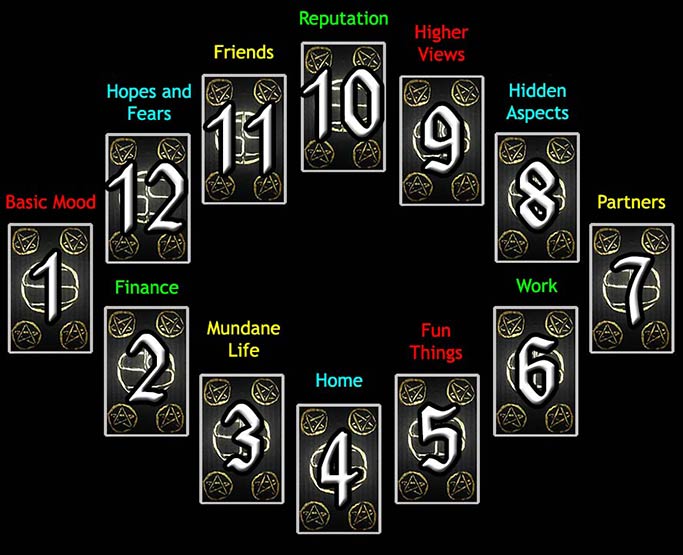
Difficulty: Complicated
The Astrological Tarot Spread is based upon houses of astrology. This complicated spread takes several steps to understand.
The first step is to interpret the tarot card for each individual position in the spread.
The second step involves further examination of the main axes. Positions 1 & 7 show the relationship theme, #1 representing the reader, #7 their partner. Positions 4 & 10 indicate motion. #4 indicates where the reader is now, and #10 suggests what they are moving towards.
The third step involves breaking down the chart into triads according to their house elements.
Positions 1, 5, & 9 represent the Fire triad, symbolising temperament and personal development.
Positions 2, 6, & 10 represent the Earth triad, concerned with materialism, money, and work.
Positions 3, 7, & 11 represent the Air triad, which has to do with thoughts, ideas, and connections with other people.
Positions 4, 8, & 12 represent the Water triad, the realm of emotions, moods, intuition, and yearnings.
Further, other patterns and correlations between certain numbers can be noted. Certain numbers such as the set of 5, 7, & 8 often speak about a particular theme.
Your Astrological Reading
| 10 | ||||||
| 11 | 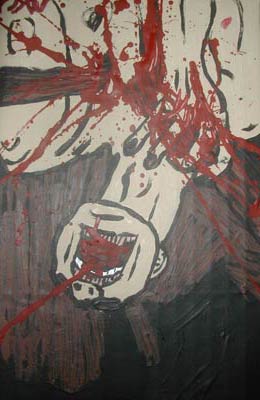 |
9 | ||||
| 12 | 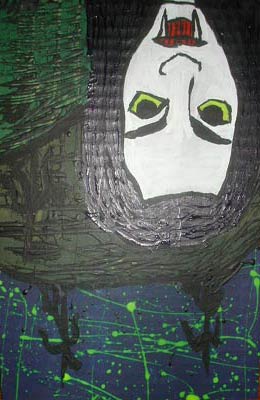 |
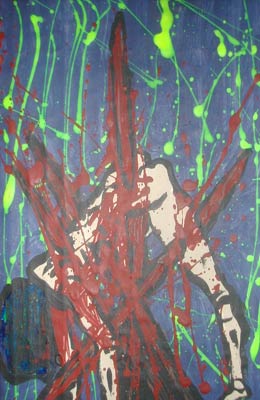 |
8 | |||
| 1 | 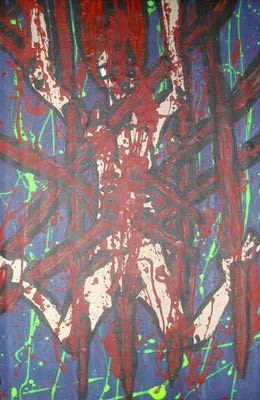 |
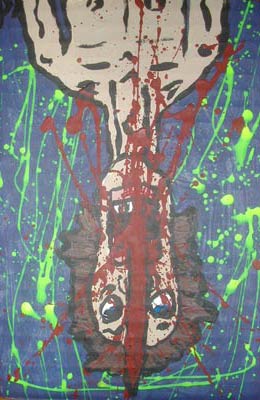 |
7 | |||
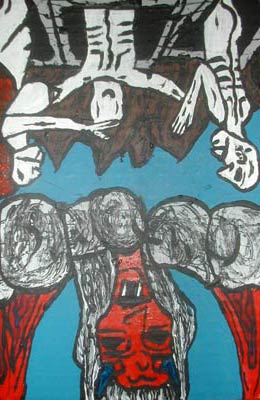 |
2 | 6 | 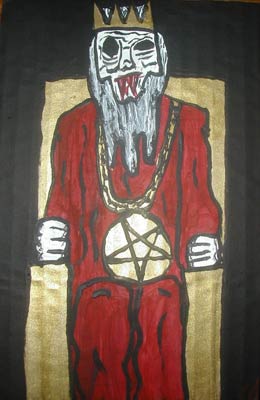 |
|||
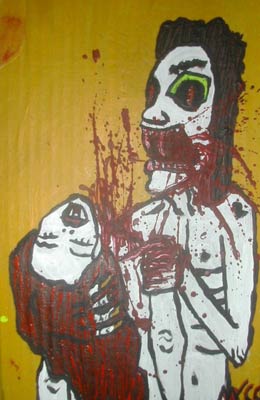 |
3 | 5 | 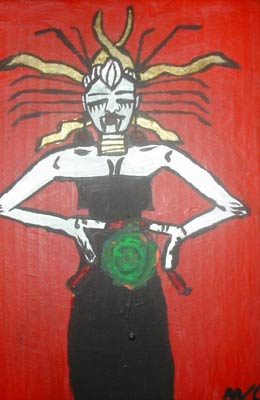 |
|||
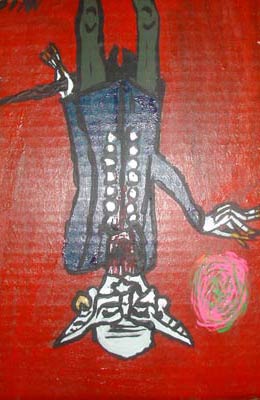 |
4 | 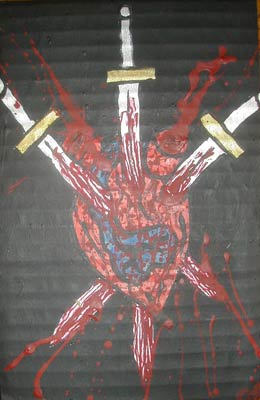 |
||||
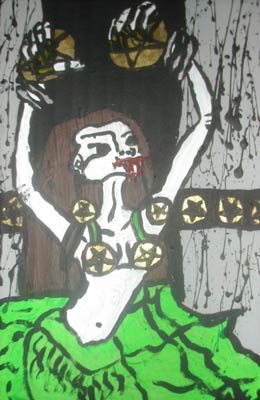 |
1: Basic Mood

Reversed
Symbolism:
Judgment depicts a haunting scene of the dead rising from crypts bathed in an eerie, silvery glow. A vampire angel hovers above, blowing a trumpet, its sound visible as luminous, curling waves. The figures below lift their arms skyward, drawn by the call to awakening. A massive, ancient tree stands in the background, its roots tangled with bones, symbolizing the cyclical nature of life and death.
Meaning:
Judgment signifies renewal, self-assessment, and a call to rise above the past. It asks you to confront your actions, choices, and truths, encouraging accountability and forgiveness. This card often appears during moments of profound transition, marking the opportunity to shed old burdens and embrace a higher purpose.
Reversed, Judgment warns of self-doubt, avoidance, or fear of change. It suggests a resistance to growth or ignoring the need for reflection.
Keywords:
Reversed: Self-doubt, avoidance, fear of change, lack of reflection, denial, stagnation.
2: Finance

Symbolism:
The Lovers stand under a blood-red moon, their forms entwined yet distinct. One figure appears human, while the other is clearly vampiric, emphasizing the tension between attraction and duality. Between them, a single rose blooms, its petals tinged with crimson—a symbol of both love and sacrifice. In the background, a shadowy figure looms, hinting at the influence of external forces or choices yet to be made.
Meaning:
The Lovers symbolize connection, union, and the choices that shape our relationships and paths. This card often appears during moments of deep emotional connection or when a major decision requires alignment with your values and desires. It reminds you to consider the balance of give and take in relationships, whether romantic, platonic, or spiritual.
Keywords:
Upright: Love, connection, union, harmony, choice, alignment, trust, passion.
3: Mundane Life

Reversed
Symbolism:
The Magician is depicted as a Nosferatu vampire standing in a commanding pose, a sphere of influence hovering above his outstretched hand. This sphere glows with an otherworldly light, symbolizing his power to manipulate unseen forces. His posture exudes confidence, and the tools of his craft—representing the elements—are subtly embedded in the imagery, hinting at his mastery over earth, air, fire, and water. The shadows around him pulse with potential, representing untapped energy and possibility.
Meaning:
The Magician embodies willpower, creativity, and the ability to manifest one's desires. He is the ultimate initiator, reminding you that you have the power within to transform ideas into reality. This card urges action and focus, calling upon the seeker to harness their innate talents and take charge of their destiny. In situations requiring ingenuity or problem-solving, the Magician assures you that all the tools you need are at your disposal.
Reversed, this card warns of misuse of power, manipulation, or deceit. It may suggest self-doubt, a lack of clarity, or misguided actions that backfire due to overconfidence or ill intentions.
Keywords:
Reversed: Manipulation, deception, power misuse, lack of direction, overconfidence, self-doubt.
4: Home

Symbolism:
An exotic dancer raises the energy of her audience, clasping pentagrams in hand. This scene represents the completion of a cycle, where comfort, security, and family are at the forefront of life.
Meaning:
The Ten of Pentagrams signifies family, wealth, and long-term security. It reflects a period of contentment, with all your material and emotional needs met. This card highlights the importance of legacy, home, and lasting success.
Keywords:
Upright: Family, wealth, legacy, security, completion.
5: Fun Things

Symbolism:
Three swords pierce a heart, set against a backdrop of dark, foreboding clouds. The heart bleeds, symbolizing the deep pain of betrayal and heartbreak. The ominous sky reinforces the emotional intensity and the sorrow attached to this card.
Meaning:
The Three of Swords is a card of emotional pain, heartbreak, and grief. It represents suffering from loss, betrayal, or separation. The heart pierced by swords highlights the emotional wound, urging you to confront the pain to begin healing.
Keywords:
Upright: Heartbreak, sorrow, grief, emotional pain, loss.
6: Work

Symbolism:
The High Priestess holds a luminous sphere of power close to her womb, symbolizing the nurturing of secrets and inner knowledge. She is cloaked in flowing robes of dark and silvery hues, blending shadow and light to represent duality and balance. Behind her, the faint outline of a moonlit landscape hints at the cycles of nature and the mysteries of the subconscious. Her gaze is serene yet penetrating, as though she sees through to the core of truth.
Meaning:
The High Priestess signifies intuition, hidden wisdom, and the power of stillness. She encourages introspection and the pursuit of knowledge that lies beneath the surface. This card often appears when it is time to listen to your inner voice and trust the subtle cues of your environment. It may suggest secrets yet to be revealed or a need to delve deeper into your own emotions and spirituality.
Keywords:
Upright: Intuition, mystery, inner wisdom, reflection, subconscious, patience, hidden truths.
7: Partners

Symbolism:
A wise king adorned with a large pentagram holds his reign in a posture of strength and control. He represents mastery over material resources and the ability to wield power with integrity and wisdom.
Meaning:
The King of Pentagrams signifies success, mastery, and the completion of a journey towards wealth and stability. This card speaks to practical wisdom, resourcefulness, and the ability to create long-lasting success. It encourages you to embody leadership and strategic thinking in your endeavors.
Keywords:
Upright: Mastery, success, leadership, stability, resourcefulness.
8: Hidden Aspects

Reversed
Symbolism:
A gruesome image of a wand protruding violently from a man's gory mouth speaks of an unsettling birth of new energy. The blood and horror in the scene hint at the raw, primal force of creation and the sometimes destructive nature of beginnings. The Ace of Stakes is imbued with potential and an uncontainable spark of energy, emphasizing both opportunity and the challenges of harnessing such power.
Meaning:
The Ace of Stakes represents the genesis of an idea, a bold new venture, or the start of a passionate endeavor. It speaks to raw energy, inspiration, and an awakening of latent talents. This card calls on you to seize opportunities with courage and creativity, even if they feel daunting or chaotic. It's a card of new beginnings, enterprise, and the ability to transform challenges into strengths.
Reversed, the Ace warns of missed opportunities, destructive impulses, or stagnation. It may suggest that a new venture lacks foundation, or that the energy of creation is being misused or blocked.
Keywords:
Reversed: Missed opportunities, recklessness, misdirected energy, stagnation.
9: Higher Views

Symbolism:
A nude figure hangs suspended mid-air by four bloody stakes. This haunting tableau evokes themes of rest, stability, and a grim sense of harmony. The stakes form a secure structure, suggesting that even amidst horror, there can be moments of peace and reprieve.
Meaning:
The Four of Stakes symbolizes a haven or moment of stability amidst chaos. It represents harmony, home, and the celebration of achieved milestones. This card is a reminder to cherish moments of peace and recognize the beauty in completion. It signifies prosperity and contentment within your personal or professional life.
Keywords:
Upright: Stability, harmony, home, celebration, peace, completion.
10: Reputation

Reversed
Symbolism:
A vampire spews forth the life force he has consumed, a dramatic display of surprise and chaotic energy. The heart, pierced by a stake, symbolizes duality—an ending and a new possibility, the destruction of one path to illuminate another. The overflowing energy represents the unpredictability of partnership and cooperation.
Meaning:
The Two of Stakes signals a crossroads where choices must be made. It is a card of balance and partnership, representing the potential for collaboration or conflict. This card urges careful consideration and planning before proceeding, as your choices now will shape your future path. It can signify unexpected surprises, wonder, and a touch of enchantment that transforms your perspective.
Reversed, the card warns of discord, minor disappointments, or fear of moving forward. It may reflect internal struggles or external obstacles disrupting harmony.
Keywords:
Reversed: Conflict, disappointment, delays, fear, internal struggle.
11: Friends

Reversed
Symbolism:
The Queen of Stakes stands proudly, her fangs bared in defiance. The impaled victims behind her serve as a stark reminder of her strength and resolve. She is both nurturing and fierce, embodying the duality of creation and destruction.
Meaning:
The Queen of Stakes symbolizes independence, confidence, and the ability to lead with compassion and strength. She encourages you to harness your inner power and remain true to yourself. This card often indicates success in business or personal endeavors.
Reversed, the Queen warns of jealousy, deceit, or opposition. It may also suggest a lack of self-confidence or struggles with balancing emotions.
Keywords:
Reversed: Jealousy, deceit, insecurity, opposition, imbalance.
12: Hopes and Fears

Reversed
Symbolism:
A grotesque figure hangs upside down, pierced by nine stakes in a horrific display of defiance and suffering. The unsettling scene illustrates the resilience required to endure opposition and remain steadfast in the face of challenges.
Meaning:
The Nine of Stakes is a card of resilience and strength under pressure. It symbolizes the final push before success, encouraging you to persevere despite fatigue or hardship. This card warns of challenges but assures you that your determination will see you through.
Reversed, the card signals obstacles, delays, or setbacks. It may also indicate a need for rest or recovery before resuming the fight.
Keywords:
Reversed: Setbacks, fatigue, delays, obstacles, vulnerability.
